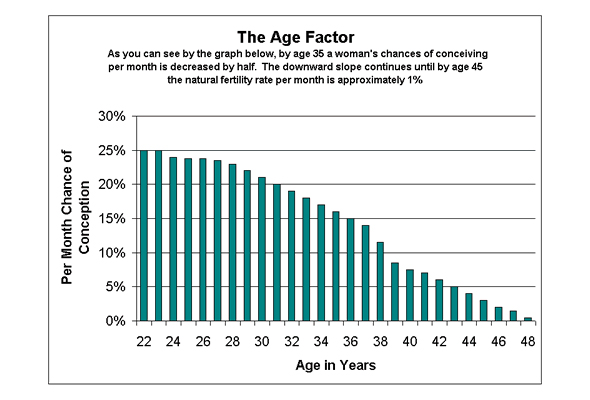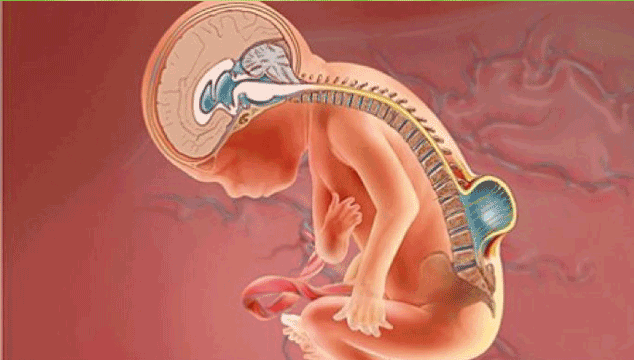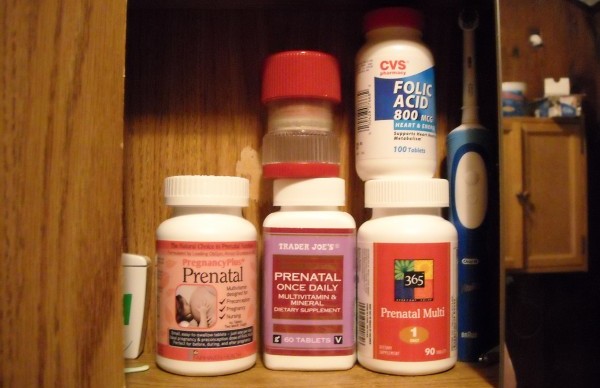Scroll through your Facebook news feed, turn on your evening news, or listen to the radio on your way to work. Chances are, somewhere along the lines, you are going to hear about a celebrity who is pregnant, has just given birth, or who has become a mom over the age of 40. It’s common place nowadays, no longer taboo, and it seems like more and more often, women are waiting until later in life to start families and get pregnant. Claim Your 20 Free Pregnancy Tests – Click Here
Not convinced? Just take a teeny tiny sample of the population: Hollywood.
Celeb moms are probably the most common when it comes to giving birth over 40, and we hear about it all the time. Gwen Stefani had the youngest of her three boys when she was 44, and Halle Berry actually had both of her children in her 40’s. Salma Hayek didn’t have her first baby until she was 40, and so was Helen Hunt. Nicole Kidman, although she was already a mom, gave birth to her first biological child at the age of 40, and Mariah Carey had her twins at age 42. These are only a few of the many, many celeb moms who have given birth over 40.
They make it look easy, but we have to remember, celebs have loads of cash, which also means they have access to the best doctors, best fertility pills, best personal trainers, and best medical treatments.
They definitely do NOT represent what it’s like for all moms getting pregnant after age 40.

There are so many reasons why women might want to wait until later in life to get pregnant. Some women already have babies or children, and are simply wanting to continue to grow their families after the age of 40. For some women, they simply hadn’t been ready to start a family until their 40’s, whether it be finding the right relationship, or getting to a good, stable place in their careers or finances. Some women want to travel the world and accomplish all of the things on their “bucket list” before settling down and becoming a mom. Some women just haven’t found it to be the “right time” until they are in their forties. Whatever the reason, more and more moms are waiting until later to get pregnant.
Gwen Stefani had her youngest child at 44

Being an “older” mom definitely sometimes comes with a little bit of stigma attached to it. However, some women say there are major perks to waiting until later in life to become a mom. First of all, older moms are usually more well established in life as compared to younger moms. Older moms are more likely to be financially secure, and to be settled into a comfortable life of career, relationship, paying bills, etc.
The strain of having a baby isn’t usually so apparent in an older mom, who has “been through life” a little bit, so to speak.
Older moms are usually calmer than younger moms, and are not as prone to stress out about every little thing that happens during a pregnancy or raising a baby. Older moms are also more likely to have things planned out, such as where they will raise their baby, college savings, buying a house, a long term career, etc.
Younger moms who are just starting out may find themselves struggling to juggle all of these things while raising a newborn. There have also been studies to show that older moms are less likely to yell at their kids or offer up strict and harsh punishments. Age comes with greater maturity, experts say, and this can mean that older moms are simply more ready to take on motherhood.

Of course, there are some concerns and issues that need to be considered if a woman is thinking about getting pregnant after age 40. A woman’s fertility starts to sharply decline in her thirties, and really starts to plummet around age 35. For women to get pregnant in their forties, they need a little luck, and a lot of health.

A woman’s twenties are obviously her most fertile time, followed by her early thirties. Once a woman hits her late thirties or early forties, the chances are that she is probably starting to run out of eggs.
Every woman is born with a set number of eggs, and when they are gone, that’s simply it. This is when menopause happens, after a woman’s body runs out of eggs.

Another important thing to remember if you are considering getting pregnant in your forties is that a woman’s forties are not created equal. Every passing year in a woman’s forties, her fertility continues to decline.
In fact, experts say that women have a MUCH higher chance of getting pregnant at say, 41, than they do at say, 43.
Even more, doctors agree that it is pretty much impossible to get pregnant using a woman’s own eggs after the age of 45. It does happen every once in awhile, but that is the exception and not the rule.

We already know that getting pregnant after age 40 has some risks. First of all, getting pregnant in the first place is likely to be much more difficult, since a woman’s fertility begins to decline in her late 30’s. There are also other risks associated with getting pregnant after age 40 as well. It’s important to know that there is a greater risk of maternal health problems for women who are pregnant in their forties. Things like miscarriage, gestational diabetes and hypertension, and other health problems are much more common in older mothers.

Also, although it is unfortunate, it is true that babies born to older mothers are much more likely to have birth defects as opposed to babies born to younger moms. Down Syndrome and Neural Tube Defects like Spina Bifida are much more common in babies born to older mothers. This is simply because by the time a woman is in her forties, her most viable eggs have already been used (the body knows to release the best eggs in a woman’s younger years when she is most fertile), and the eggs that are left behind are not always of the best quality. These are the real risks of pregnancy after 40, and any woman is who thinking about getting pregnant after this benchmark age should really take this into consideration.

If you are a woman who is over 40, or a woman who is approaching forty and thinking of getting pregnant, we realize that this article might sound a bit scary or off-putting. However, it is just meant to be informative and helpful, not frightening.
There are many women out there who do get pregnant past the age of 40 and go on to have healthy, vibrant pregnancies and raise perfect babies.
My own mother had me at the age of 45, more than 30 years ago, when this sort of thing was unheard of. Keep in mind, that getting pregnant over 40 does not automatically mean that something will go wrong with the pregnancy or with the mom to be, just that there are increased risks to be aware of and vigilant about.

If you are over forty or approaching forty years of age and you are thinking about getting pregnant, your first stop should be your family doctor. Your doctor can talk to you about your goals, and if needed, can also refer you on to a fertility specialist who can better help in “high risk” pregnancy situations, like with older moms. Seeing a doctor is a great starting point because a doctor can take a look at your personal medical history as well as your family history, and your overall health to decide a plan to help you get pregnant easily and have a worry free pregnancy, delivery and birth.
#TBT: Once you have conquered #bedrest and #highriskpregnancy, it’s great to be able to go visit your Dr. to thank them for their hard work. pic.twitter.com/YSdi4vc7rD
— Jessica Fisher (@BedRestCoach) September 1, 2017

If you are considering getting pregnant after the age of forty, please be proactive about doing so. What we mean by this is, make sure that you are as healthy as you can possibly be before adding the stress of a pregnancy on your body. If you are overweight, go ahead and try to lose a few pounds before trying to conceive. Doctors say for women who are overweight, losing as few as five to ten pounds is all that is needed to “reset” a woman’s metabolism and help make it easier for her to try to conceive. Eating a healthy diet is also very important, and it’s imperative to start doing that before you start trying to conceive so that your body will be in the best possible shape to grow a baby. Lean meats, organic fruits and veggies, full fat dairy products and whole grains are so important to the body.
Along with a healthy diet, it’s important to give up bad food habits that might have an effect on your health and fertility as well. Fast foods, sugary sweet snacks, junk foods, and overly salty foods are just plain bad for you and offer no nutritional value. These foods should be avoided, especially when you are trying to conceive. Exercise is also a very important aspect of trying to conceive, since it can help to ease stress, lose weight and increase blood flow. If you have any bad habits like smoking cigarettes, engaging in drug activity or drinking alcohol, you should definitely try to kick these habits to the curb before trying to conceive. These are all things that can make it harder for you to conceive, no matter your age, so you should especially be careful to avoid them if you are trying to conceive after age 40.

For women over age 40 who are trying to conceive, it’s a good idea to go ahead and start a good quality prenatal vitamin as soon as you even begin to consider having a baby.
You DO NOT need to wait until you are pregnant to take a prenatal vitamin, unlike many women think.

Taking a prenatal vitamin before pregnancy can help “set the stage” so to speak for the healthiest pregnancy that your body can have. Prenatal vitamins can help to fill in nutritional gaps that women have from not eating properly, and can help to assure that women are getting the recommended dosages of all vitamins and nutrients that are essential for trying to conceive and pregnancy as well. For example, folic acid is a super important nutrient that hardly any women get the correct dosage of. Folic acid helps to prevent neural tube defects such as spina bifida and other birth defects. However, these defects occur super early on in pregnancy, so most women don’t even know they are pregnant, and haven’t started taking a prenatal vitamin yet.
By taking a prenatal vitamin daily while trying to conceive, you can help to prevent these defects and any other potentially harmful problems that could “sneak up” before you even know you are pregnant.
If you are trying to get pregnant later in life, it is super important that you are vigilant about these things, and do everything within your power to give yourself a “boost” to healthy pregnancy.

Stress is also a big part of the puzzle when it comes to trying to conceive for women over 40. Just the simple act of getting pregnant after age 40 is a stress inducer, as the biological clock it is a’ticking, so women who are trying to conceive need to be hyper vigilant about reducing their stress levels. Stress has actually been proven to make it harder to conceive, so don’t take it lightly. As we mentioned earlier in this article, exercise is a great stress reducer.
Laughter, of course, is also the best medicine, so don’t take things to seriously, and make time to enjoy yourself.
Make sure to include some one on one time with your partner, and keep the lines of communication open between the two of you as well. Trying to conceive is not just stressful for women, men can definitely feel it as well, so make sure that you are reaching out to your partner and taking his concerns to heart as well. If you have a family member or trusted friend that you can confide in during your trying to conceive journey, you will see that that will also go a long way towards helping you reduce stress, since you will have someone to talk to about your worries, issues and concerns.

The thing to remember when it comes to conceiving over the age of 40 is that it is NOT impossible by any means. However, it may be a little more difficult than conceiving at a younger age, and there are definitely more things to be on alert about and more things to watch out for. However, under a doctor’s supervision and guidance, women can often make the changes they need and go on to have a successful pregnancy at this age.










Comments